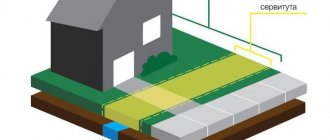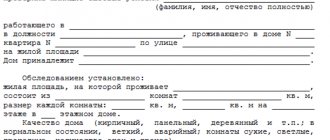Legal grounds
The owner is free to take measures to free his home from strangers, based on the provisions of civil and housing legislation (Article 85; Article 90 of the Housing Code, Article 292 of the Civil Code).
The reasons for this may be different:
- termination of family relationships;
- unauthorized entry;
- expiration of the temporary registration period for the guest;
- owner's desire;
- change of owner.
Sometimes the right of use is also terminated in relation to the unregistered owner of the property. This happens if the building is officially recognized as unsafe, unsuitable for further habitation and is planned to be demolished. Or the plot of land on which it stands is seized for the needs of the state.
Nuances of eviction
Situations related to the eviction procedure, as a rule, raise many questions, as they have a large number of subtleties that need to be taken into account. You can, of course, try to figure everything out on your own, but it’s still better to take the help of specialists. Let's look at the most common cases.
Eviction from a privatized apartment
You can evict both a registered citizen and those who do not have registration. General grounds for eviction apply. In this case, the person is not provided with another place to live. But if the defendant says that he has no other housing, then the court may give him time to look for a new apartment.
Read more: Where is the employee’s personal medical record kept?
Eviction from the only dwelling
There are times when there is only one place to live. Is it possible to evict him?
It is possible, but this requires certain reasons:
- if there is arrears on mortgage lending;
- rent arrears;
- regularly creating dangerous situations for neighbors;
- use of the apartment as non-residential premises;
- change of owner.
If there is a mortgage, the premises belong to the credit institution and it can claim the apartment as compensation for late payments under the loan agreement.
Eviction for debts on housing and communal services (Housing and communal services) is carried out on the basis of Art. 90 Housing Code of the Russian Federation. Under this article, people are evicted if tenants do not pay utility bills for a period of more than 6 months. In this case, another apartment is provided, usually a municipal one. If there are no vacant apartments on the municipality's balance sheet, the eviction will be delayed.
Not all defaulters can be left homeless; there are exceptions:
- the owner of the apartment is a pensioner, his pension is not enough to cover the debt for utilities;
- if there are dependents - children and disabled people of groups 1 and 2;
- the defaulter has a serious illness.
Eviction from non-privatized (municipal) housing
The grounds for eviction are:
- termination of the social tenancy agreement;
- improving the status of the employer;
- constant violation of the rules of residence in the apartment;
- if parents are deprived of parental rights, they are evicted, but the child remains;
- there is evidence of property damage;
- recognition of the house as unsafe.
Upon eviction, tenants must be provided with alternative housing. If a house is recognized as unsafe, then the housing that is provided in return should not be inferior in its parameters to the housing in which citizens previously lived.
You cannot evict minor children and disabled people of group 1 who need medical care from municipal housing. The plaintiff in the eviction case in this case is a representative of the municipality. The amount of state duty is calculated as for legal entities.
What legal measures can the owner take?
It is, of course, possible to warn an impudent guest in the spirit of “I’ll throw away the things and change the lock.” There is a high probability that the guest will hear and perceive it as a guide to action. But the homeowner has no right to carry out threats. Otherwise, this is fraught with administrative (Article 19.1 of the Code of Administrative Offences) or even criminal (Article 330 of the Criminal Code) liability.
Even the lack of registration as such is not considered a legal reason for eviction.
Only the following have the right to expel illegal persons:
- ships;
- police;
- bailiffs.
Thus, in case of unauthorized move-in, if the unauthorized tenants have nothing to do with your family, you can call the police. The employees will ask them to present documents: if it turns out that citizens do not have any rights to live in this territory, the law enforcement officers will simply remove them.
In all other cases you will have to go to court.
Court decisions
How to protect property rights after divorce
Unwanted neighbor: how to defend your rights to an apartment?
Apartment disputes: eviction of a family member
How to peacefully resolve housing issues
My housing: what to do if they try to kick you out of your apartment
On your own rake: what nuances should not be forgotten when it comes to the housing issue
Filing a claim
The application is submitted to the district court at the location of the home. The number of copies depends on the number of people involved. The application states (Article 131 of the Code of Civil Procedure):
- date and place of compilation;
- full name of the court site;
- apartment address;
- plaintiff's details;
- information about the responding party;
- base;
- essence of the question;
- the point why you believe that the defendant is living in the territory illegally;
- links to current legislation;
- demand to evict;
- applications;
- signatures.
In addition to the desire to get rid of uninvited tenants, the applicant has the right to demand compensation for losses incurred by him, for example, damaged finishing of the housing, as well as moral damage.
Documentation
One statement is not enough for business success. The applicant prepares a package of documents:
- general civil identity card;
- act of the local police officer;
- receipts, checks, other documents related to the issue;
- state duty check (Article 333.19 Tax Code)
All of them are submitted simultaneously with the application. If any of them is missing, this is a legal reason to refuse to accept the claim (Article 132 of the Code of Civil Procedure). The judge will refuse the claim if he does not consider the initiator’s arguments justified (Article 67 of the Code of Civil Procedure).
Eviction
If no one challenges the court decision within a month, it comes into force. The case goes into enforcement proceedings. The illegal occupant is once again warned of the need to leave the home in which he has no right to be. If this does not bring him to his senses, the procedure is carried out by bailiffs in the presence of attesting witnesses on the basis of a writ of execution (Federal Law No. 229-FZ, as amended in 2021).
The entire procedure takes up to three months. If new circumstances appear or the defendant deliberately delays the case, maybe more, sometimes even for a year.
Customer Reviews
Thanks to Stepanov D.Yu. I express my deep gratitude to lawyer Denis Yuryevich Stepanov for his high professionalism and attentiveness to his case when considering the issue in word with a contractor who improperly completed the work of erecting a screw foundation. The cost of the work amounted to 178,300 rubles. And the court of the Vyborg district (Case No. 2-1432/2018) dated March 12, 2018) to collect, taking into account all fines, 504,800 rubles. Once again, I thank you and wish you success in your future work and only successful business conduct.
Grateful to you, your client. 05/18/18
Gratitude from Volkotrub Yuri Vasilyevich Thank you very much for the quality advice on the issue that interests me. With best wishes to Denis Yuryevich Stepanov, who advised me.
Volkotrub Yuri Vasilievich
Gratitude from Gordeeva E.S. I express my special gratitude to Sergei Vyacheslavovich for his highly competent and detailed consultation on the issue of the employment contract.
Doctor of Philological Sciences, Gordeeva E.S. 12/01/2018
Review by G.N. Antropova To the lawyer of the Legal Agency of St. Petersburg A.V. Ermakov
I express my gratitude to you for your professionalism in protecting my interests in a criminal case, Andrey Valerievich, allow me to express my gratitude to you for your help and support. I note your high professionalism and skillful actions in defending my positions.
Best regards, G.N. Antropov
Thanks to Mavrichev S.V. from Bars Dan A. I thank the wonderful Lawyer Sergei Vyacheslavovich Mavrichev for thorough, competent advice and human mutual assistance to all his clients who are in deep need of qualified and timely legal and psychological advice.
Leopard Dana A. 09/18/2018
Gratitude from Balitskaya A.S. I express my deep gratitude to Alexander Viktorovich Pavlyuchenko for his efficiency and professionalism in resolving controversial issues. The pre-trial settlement was completed as quickly as possible.
Balitskaya A.S., 05/15/2019
Gratitude from Natalya Gurova I would like to express my gratitude for the qualified and friendly advice from legal practitioner Daria Igorevna Zaprudnaya, Vasily Anatolyevich Kavalyauskas and Daria Valentinovna Kutuzova. The environment at the law firm is welcoming and professional. I wish you continued prosperity. Thank you for your help.
Best regards, Natalia Gurova. 07/06/2018
Gratitude from Soboleva E.P. I would like to express my deep gratitude to Vasily Anatolyevich Kavaliauskas for his literacy, consultation and attention to the client who found herself in a difficult situation; as well as wonderful, sensitive administrators. I wish the company prosperity and good clients.
Sincerely, Soboleva Elena Petrovna. September 19, 2018
Gratitude from Tunnova L. Sergey Vyacheslavovich! Thank you for the qualified advice you provided regarding my question in the field of consumer protection (dispute with TC OPT, the kitchen was not delivered)
Lyubov Tunnova December 12, 2018
Gratitude from Plisetsky V.V. I would like to express my gratitude to Sergei Vyacheslavovich Mavrichev for his sensitive attitude and understanding towards clients. The issue was resolved within one day. I am very grateful to Sergei Vyacheslavovich.
Plisetsky V.V. October 19, 2018
Nuances
It is often advised to do this: if an insolent guest leaves, the locks are changed and an iron door is installed. All his things are simultaneously placed on the staircase when he arrives. Even if a person contacts the police, this is unlikely to help in any way, since law enforcement officers will first ask where he lives and make sure that his registration is at a different address. You, in turn, will answer that such people do not live here.
However, this method is applicable only if there is an illegal settlement, and the citizen really does not have any rights to be present in this territory. Moreover, he will have the right to complain about the loss of some of his things or money, if any, and declare his expulsion as illegal.
In any case, if you are faced with just such a case, it is better to first consult with a lawyer. He will tell you what to do and represent your interests in the courtroom. This will significantly reduce the time to resolve the issue and will not allow the issue to drag on.
Procedure for eviction of illegally residing persons from an apartment
The most common method of depriving the right to inhabit is a lawsuit. This act is understood as leaving the living space of a citizen deprived of the right to exist at this address with the personal property and animals of the violator.
Read more: Who should install a gas stove in an apartment
The “occupier” of square meters has the following prerogatives:
- during the procedural proceedings, the person has the opportunity to present evidence of his rights to the disputed territory;
- in case of disagreement with administrative expulsion by the prosecutor's office, a person can appeal it in court.
When purchasing square meters with persons registered in it, the issue is closed only by legal means of obtaining a decision to remove them from registration.
The situation may become more complicated in the following cases:
- If a minor child is registered at the purchased address. To avoid such a situation, before completing a purchase and sale transaction, request an official certificate of the absence of a registered child or a certificate from the guardianship authorities. According to the law, a young child must be registered at the place of registration of the mother. And in the event of a child being discharged through litigation, it is necessary to have an act of actual non-residence of this child in this living space.
- If the registered person has the right to lifelong use of the apartment. In this case, the evidence will be the reports of the local inspector on violation of the rules of residence and the testimony of neighbors.
- When the rooms were privatized by the previous owners, one of the family members signed a waiver of privatization, which gives him the privilege to use the space for life. If you voluntarily refuse to register at the address of the proceedings in a lawsuit, you will need written evidence of his violations of the law, since legal proceedings in this case are a futile exercise.
It is also necessary to note categories of citizens who have their own specific nuances when discharged:
- persons deprived of parental rights are subject to deregistration without their consent and additional conditions;
- persons sentenced to a term of imprisonment may be discharged if the owner has a conviction; but after release, a person can apply for registration with resettlement or compensation payments from the owner;
- conscripts for military service are discharged from their homes and registered at the place of military service according to lists compiled at military registration and enlistment offices; during the absence of a conscript, any real estate transactions are possible; after the end of the service period, the serviceman has no grounds for challenging;
- persons considered missing or dead are discharged by decision of justice; even if they appear, a reversal of the procedural decision is impossible; the exception would be evidence of intentional actions of the owner of the square meters directed against the discharged person.
Reasons for deprivation of legal possibility of residence, which will be significant in the proceedings:
- Divorce of marriage.
- Change of owner of real estate.
- According to reasoned justifications of the owner of the object.
- Expiration of the lease or rent of square meters.
In these situations, resettlement occurs without the provision of other useful quadrature or compensation from the initiator of the claim. Moreover, only the owner of the property, even those who do not have registration in the disputed territory, can submit an application.
The legal owner can also be evicted from his monastery with compensation in the event of:
- the property is located on a plot of land that is being seized by the state;
- dilapidated and dilapidated dwellings, officially recognized as such, are subject to demolition.
The conclusion on the deprivation of the owner of real estate is made only by the judicial authority.
Without a verdict, the actions of the authorities responsible for deportation are considered unlawful, and the victim may request compensation for moral damages.
Removal from the area donated to a third party occurs with reference to Article 292 of the Civil Code of the Russian Federation, which makes the donee the sovereign owner of the area. In court, the nuance when evicting other people registered at this address is proof that for justifiable reasons there is nowhere to move. Often the Themis prescribes the possibility of temporary stay for a regulated period, which is usually no more than a year.
When receiving an inheritance in the form of real estate, everyone living in the home up to this point is treated as a person who has lost the right to use the home.
And at the request of the new owner they must be deregistered. But in legal proceedings, a moment often arises, as in the case of a donated apartment, where the option of awarding temporary residence is possible.
To deprive the right to use space in a state house, it is also necessary to initiate litigation. The issue is being considered with reference to Articles 90 and 91 of the RF Housing Code. The evidence base is acts of violations of the law by residents, signed by neighbors. Certificates of debt, copies of notices of the administration’s intentions to refuse the provision of rooms or proposals for voluntary abandonment of an unauthorized occupied quadrature.
If tenants are unwilling to leave their rooms voluntarily, they are also deprived of their rooms by court decision. A local inspector is involved to draw up a protocol to establish the identity of the persons in the premises and their rights to the occupied space.
The eviction of illegally residing citizens from any residential premises on the basis of a court decision is a matter for the bailiff and the police. Their actions are regulated by Article 107 of the legislation on Enforcement Proceedings and the workload standards for bailiffs.
In his work, a justice worker performs the following actions:
- Based on the writ of execution, he makes a decision and opens enforcement proceedings, notifying both parties to the conflict.
- Performs operations to voluntarily resolve the issue, that is, remove citizens who do not have rights.
- If voluntary execution is refused, an enforcement fee is collected from the guilty person.
- If the requirements are not met, it proceeds to enforcement actions with the involvement of the police. The presence of two witnesses is required.
The statute of limitations for cases of deprivation of residence rights is 3 years from the date of entry into force of the conclusion. However, the limitation period does not apply if the case is qualified under Article 208 of the Civil Code of the Russian Federation.
FAQ
The ex-wife refuses to move out, citing the fact that she is with the child and no one will kick them out. Is this really true?
If neither your ex-wife nor your child are co-owners of the living space and are not even registered at the address, then it is very easy to evict them. File a claim based on Art. 31 LCD. Attach the document on the termination of the marriage and the decision on alimony, if any. Pay the fee. The requirements will be satisfied. It is illegal to kick them out on your own.
The tenant refused to leave the apartment on time, claiming that he had nowhere to go and no money. Can I just throw his things outside?
It is impossible to take independent measures to remove tenants from your territory, no matter how arrogant they may be. Even if the temporary registration period has expired. This is illegal and threatens at least administrative liability (Article 19.1 of the Administrative Code). If you did not write to the person demanding to leave the premises, do so, and then contact the district court at the location of the living space.
Upon returning from a business trip, it turned out that the apartment was rented out by a neighbor to strangers. How to kick them out?
If you find citizens who have moved in without permission, introduce yourself and demand an explanation from them. Maybe they will leave on their own. If not, call the police. Employees of the Ministry of Internal Affairs will help them find a way out. You can also sue the arrogant “guests” if they damaged household appliances, furniture, interior decoration of the apartment or managed to flood the neighbors. Demand compensation for moral damages. Moreover, you have the right to complain both about those who moved in and about the neighbor who decided to profit.
Moving in a child under 18 years of age
In accordance with the general rules, the consent of the owner is required to move into a person’s residential premises. However, this is not always the case.
The Supreme Court has repeatedly explained that in the situation of moving in a child under 18 years of age, the norms of family law are taken into account. And they indicate that parents are obliged to raise their child, and this is impossible against the background of separation.
In addition, the place of residence of children until the age of fourteen is considered to be the place of residence of their parents. As a result, the court may force the owner to move the child into the apartment where his parents live, even if the owner of the property is against such a neighborhood.
Circumstances under which the owner will be deprived of his only home and real life examples
Relatively rare, but there have been situations when everything was the other way around - parents moved into the apartment where the child lives. In this case, the court also refers to family law, and an additional reason is the parent’s lack of suitable housing to live with the child. And also, if his financial situation is such that he does not allow him to rent an apartment for a long period of time.





